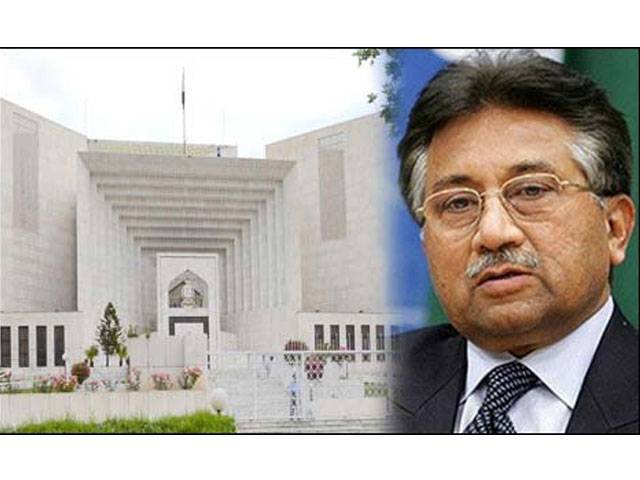islamabad - General (Retd) Pervez Musharraf’s lawyers, who are defending him in the high treason case, Wednesday clashed with each other in the courtroom over the claim of being the leading counsel of former President of Pakistan.
A three-judge bench, headed by Justice Jawwad S Khawaja and comprising Justice Khilji Arif Hussain and Justice Ejaz Afzal, was hearing six identical petitions against Musharraf for subverting and abrogating the Constitution by promulgating Emergency and PCO in the country on 3rd November 2007.
Onset of the hearing, in the absence of Ahmed Raza Kasuri, Ibrahim Satti came to the rostrum and said that he had consultations with his client previous day (Tuesday) and his instructions received at 6:00 p.m., which were later confirmed by SMS on his mobile that there will not be further arguments over the matter and if Kasuri wanted then he could give application for that.
He said Qamar Afzal’s arguments were to the extent of maintainability of the petitions. Three Supreme Court lawyers, Ahmed Raza Kasuri, Ibrahim Satti and Qamar Afzal have represented Musharraf in the case since 8th April, which proceedings are held on daily basis.
Ahmed Raza Kasuri, senior lawyer, who was arguing the case yesterday (Tuesday) when the hearing was adjourned for Wednesday, entered the courtroom late to resume pleading was stunned to the submission of Satti. He contradicting the statement of Satti told the bench that he was the leading counsel of former president and had received instructions regarding the case at 11:00pm previous night. There was also serious conflict between the former military dictator counsels’ Ibrahim Satti and Ahmed Raza Kasuri that whether the court should proceed against Musharraf and others for taking the 3rd November measures.
Satti argued that his client (Musharraf) had no desire of action against anyone including himself for holding in abeyance the constitution. Kasuri a day ago (Tuesday) had argued that if the court wanted to initiate proceeding against Musharraf then action should also be taken against all the abettors and conspirators, who according to him, are 400 to 500 persons involved in the 3rd November 2007 emergency in the country. The court noted that both the counsels acting on behalf of Musharraf are at variance and have different stance about the instructions. Justice Jawwad said: “We don’t know whose arguments we accept in this case.”
At that moment, Sheikh Ahsan-ud-Din, one of the petitioners, urged the court to summon Pervez Musharraf in person to resolve the controversy. The court on his request directed Pervez Musharraf to submit written statement about his leading counsels and stance pertaining to the petitions filed in the case during the course of the day (Wednesday). “If in future Musharraf presence was required then the court could consider the issue seriously,” the short written order said.
Earlier, Ibrahim Satti submitting gist of his arguments contended: “Musharraf does not want any adjudication regarding his possible legal pleas from this bench as it may prejudice him at this stage and the same will be raised and advanced at appropriate stage in proper forum.”
The learned counsel said that the judgement passed by the 14-member bench in SHCBA case was silent as far as the prosecution of high treason is concerned as the 5-member bench of the apex court in PLD2005 SC 719 has held that initiation of proceeding of high treason is outside the domain of this court and declined/refused the prosecution of respondent.
The court should show judicial restraint otherwise there will be an impression that this court is complainant or desdiring the trial of respondent (Musharraf).
Satti further argued that constitution petitions before the apex court and SHC are not in public interest, based on misconception and are not maintainable as not within the scope of Article 184(3) therefore should be dismissed.
He said that if at all the executive decided to prosecute Musharraf under high treason then the reason portion of 31st July 2009 judgement in para 56 shall not prejudice the fundamental rights of fair trial to Musharraf as guaranteed under Article 10A of Constitution. The case is adjourned for today (Thursday).
Friday, April 19, 2024
Mush hearing adjourned as defence counsels contradict each other

Formula 1 returns to China for Round 5
9:05 PM | April 19, 2024
Germany head coach Julian Nagelsmann extends contract till 2026 World Cup
9:00 PM | April 19, 2024
IMF urges Italy, France to spend less, Germany to loosen purse strings
8:57 PM | April 19, 2024
PM calls UAE president, admires Emirati leadership's response to recent Dubai rains
8:55 PM | April 19, 2024
Church leader calls for including Christians in Gandhara Corridor
8:50 PM | April 19, 2024
A Tense Neighbourhood
April 19, 2024
Dubai Underwater
April 19, 2024
X Debate Continues
April 19, 2024
Hepatitis Challenge
April 18, 2024
IMF Predictions
April 18, 2024
Kite tragedy
April 19, 2024
Discipline dilemma
April 19, 2024
Urgent plea
April 19, 2024
Justice denied
April 18, 2024
AI dilemmas unveiled
April 18, 2024
ePaper - Nawaiwaqt
Advertisement
Nawaiwaqt Group | Copyright © 2024





